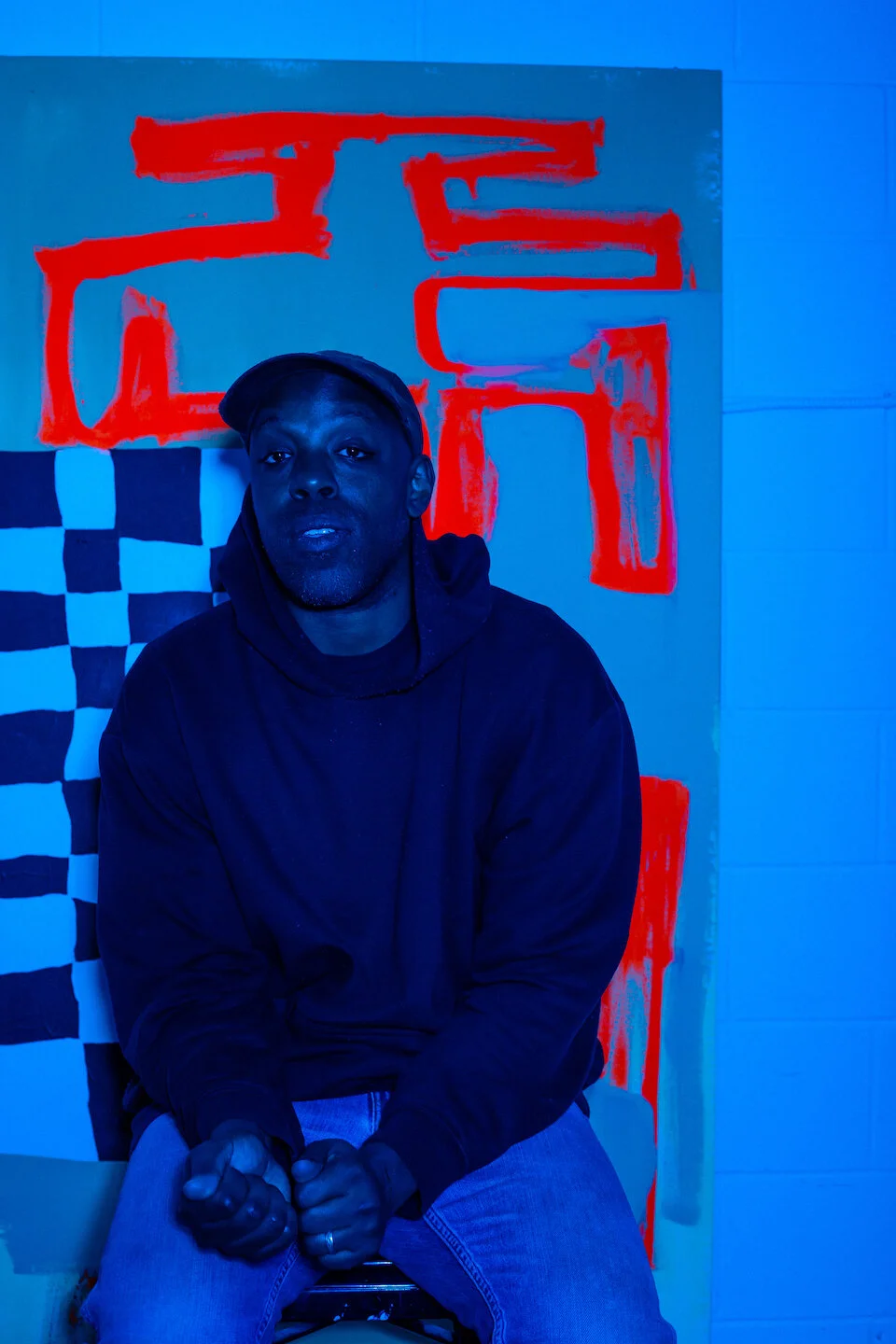Click Image to Download!
Draw a circle on a page. Now—what do you do next? Do you sketch a smiley face? A peace sign? An anarchy symbol? A yin-yang? A boob? A pie chart? A pizza? When you draw a circle, the space is finite, but the possibilities and meanings are endless. And that’s how Shad has approached hip-hop over his 16-year career to date: as an established, readily understood artform that nonetheless contains multitudes. Over the course of five records to date, the JUNO Award-winning Toronto rapper has used an array of old-school tools to tackle modern problems, addressing the indignities and absurdities of our world through a shapeshfiting melange of boom-bap breaks, dusty soul samples, jazzy improvisation, and 10 dollar words rolled into thousand-dollar rhymes. But after weaving his myriad musical and philosophical interests into a socio-political song cycle on 2018’s A Short Story About a War, Shad began building his sixth record, TAO, from a much simpler concept: an image of a circle. Though, in true Shad fashion, he saw something much more profound within its basic round boundaries.
“I’m still very much an album artist—I need some kind of overarching idea to really get me going as a writer,” Shad says. “And the thing that inspired this record was this image in my mind of a circle, but it’s getting fragmented, and then the pieces start floating away from each other. And that felt to me like a picture of ourselves as individuals. If you think of our humanity as one whole, there’s all these different aspects of that, whether that’s work, or our relationship to the land, or our relationship to the transcendent, or our relationship to our bodies, or to our inner child. That was on my mind for a while: What’s happening to all these different dimensions of ourselves?”
On a track-by-track basis, TAO examines the many different fragments that make up who we are, forsaking the explicit narrative connectivity of A Short Story About a War for a more implicit thematic framework. And where its predecessor’s intense storyline naturally chanelled a more intense, even angry spirit, the looser structure of TAO allows Shad to return to his “natural strike zone” of more playful, block-rocking bops—the sort of tracks that might make you smile and snicker even as they unpack the thorniest of topics. You can instantly sense that energy shift on album opener “Out of Touch,” whose loopy piano melody, stuttering beat, and divine chorus hook (courtesy of fellow Toronto rapper Phoenix Pagliacci) ease us into a rapid-fire treatise where Shad effortlessly threads the needle through colonialism, capitalism, racism, techonological addiction, and spiritual emptiness in three minutes flat, providing us with an easy road map to navigating TAO’s ideological terrain. “When I wrote that song, I was like, ‘this is the thesis statement,’” Shad says. “It touches on all the different things that the songs later take on one by one.”
He quickly dives right into the weightiest, most abstract subject of all with the dramatic, string-swirled “GOD,” a track that ponders “our relationship to the sacred and transcendent,” weaving in snippets of recorded conversations with Shad’s parents where they address the question: What does it mean to be human? But on “Work,” he tackles a different kind of existential quandary: What is the worth of a human in a labour marketplace that has increasingly devalued it, and how can we define ourselves beyond the roles we assume in order to pay our rent? “Since the Industrial Revolution, work has been less and less connected to community, and less and less connected to real value that we understand,” Shad says. “At the same time, work has also become more and more precarious and more and more unavailable. I don’t know if we have a system of thinking about ourselves outside of how we participate in life. That’s a real crisis.” He unleashes that frustration in the most cathartic way possible: with a mosh-pit-ready banger that crowd-surfs between Rick Rubin’s pioneering punk/rap fusions and the industrialized clamor of Yeezus.
After taking stock of the big picture, TAO starts drilling down to interrogate the many roles technology plays in our lives. The breezy, readymade summer jam “Slot Machines” isn’t just a comment on the addictive nature of social media, it reminds us that “refresh” functionality was actually modelled upon the compulsive, lever-pulling behaviour of casino gaming. The three-part title-track suite, meanwhile, probes the corrosive effects of constant connectivity on our physical and mental wellbeing, and, in the process, it reveals TAO’s dual meaning as a reference to both the Chinese philosophy of naturalism and to CS Lewis’ highly prescient 1943 book, The Abolition Of Man.
“I was reading this book called The Age of Surveillance Capitalism,” Shad explains, “and what I took away from it was this idea that we, as a society, kind of have to decide what we want for ourselves, because we’re just letting these things happen by allowing companies like Google and Facebook to have all sorts of power to dictate the shape of our lives. So that brought CS Lewis to mind. Even though he never would’ve imagined the technologies that exist today, he was writing about the same thing: Without some kind of firm, philosophical grounding and some firm ideas of what we want and don’t want, we will get pushed into different directions by certain forces.” That point is illustrated most powerfully on the astonishing “TAO Pt. 3,” a six-minute MC masterclass where Shad outlines how the symbiotic relationship between technological dependence, disinformation spread, and social isolation inevitably leads to incidents like the 2017 Quebec City mosque shooting. “This stuff is not a game,” he says. “You can laugh at Trump, because he may seem cartoonish, but the consequences are real.”
Still, for all its unflinching observations on the seemingly irreparable state of the world, TAO is a record that radiates positivity, joy, and, humour—and it’s not afraid to dial up the irreverence as it wades into increasingly uncomfortable conversations. Sounding like a trap remix of an ‘80s sitcom theme, “Black Averageness” cheekily dissects a pop-cultural landscape where Black people are either represented as blinged-out, ultra-rich celebrities or powerless dirt-poor outcasts, while ignoring the many who happily exist somewhere in the middle, and who don’t necessarily aspire to be the next LeBron James or Beyoncé—and, most importantly, shouldn’t have to if they want to succeed in life. “There’s this idea of Black excellence, which is great and universally celebrated, but I think real progress for us is just being able to be a B or a C,” Shad says. “It’s about the freedom to fail, the freedom to be just average. There’s this ‘you’re either at the top or you’re at the bottom’ aspect to Black life. Like, you don’t hear a lot of songs or see a lot of movies about, say, Stanley from The Office!”
But nowhere is TAO’s generous spirit more present than on the album’s ecstatic centerpiece, “Storm,” a heady swirl of ‘70s funk propulsion (courtesy of Toronto alt-rockers Jane’s Party), soul-powered melodies (Pagliacci, again), and stream-of-consciousness spoken-word (from the former Poet Laureate of Canada, George Elliott Clarke). The track is so intoxicating, Shad doesn’t even jump on it until we’re two-and-a-half minutes in. And fitting for a song with such strong disorienting properties, “Storm” actually came to Shad in a dream. “When I’m working on music, this happens a lot: I go to sleep and I hear music and I dream music,” Shad says. “And this was a song I heard in a dream—the chorus and the groove. In my dream, I saw people dancing to this song in this small record store—it was some sort of obscure record, but this little community all knew it, and they loved it. The dream was a little bit ominous, too—it was stormy outside, and it felt like I was drunk, and everything was a little soft focus and wobbly. So I was trying to reconstruct that vibe.”
While it’s easy to interpret that dream as a desire for togetherness in the age of quarantine, TAO was actually written and recorded before the COVID-19 pandemic forced us into hiding. And yet, the events of the past year have only amplified the album’s sense of currency and relevancy. As Shad notes, “COVID is almost not like a new situation—it just sort of accelerated what was already happening in terms of isolation and precarity of work.” But now that vaccines are allowing us to take our first steps back to the lives we once knew, TAO’s arrival is perfectly timed for a world that’s ready to laugh, hug, and dance together again. The circle is complete.










